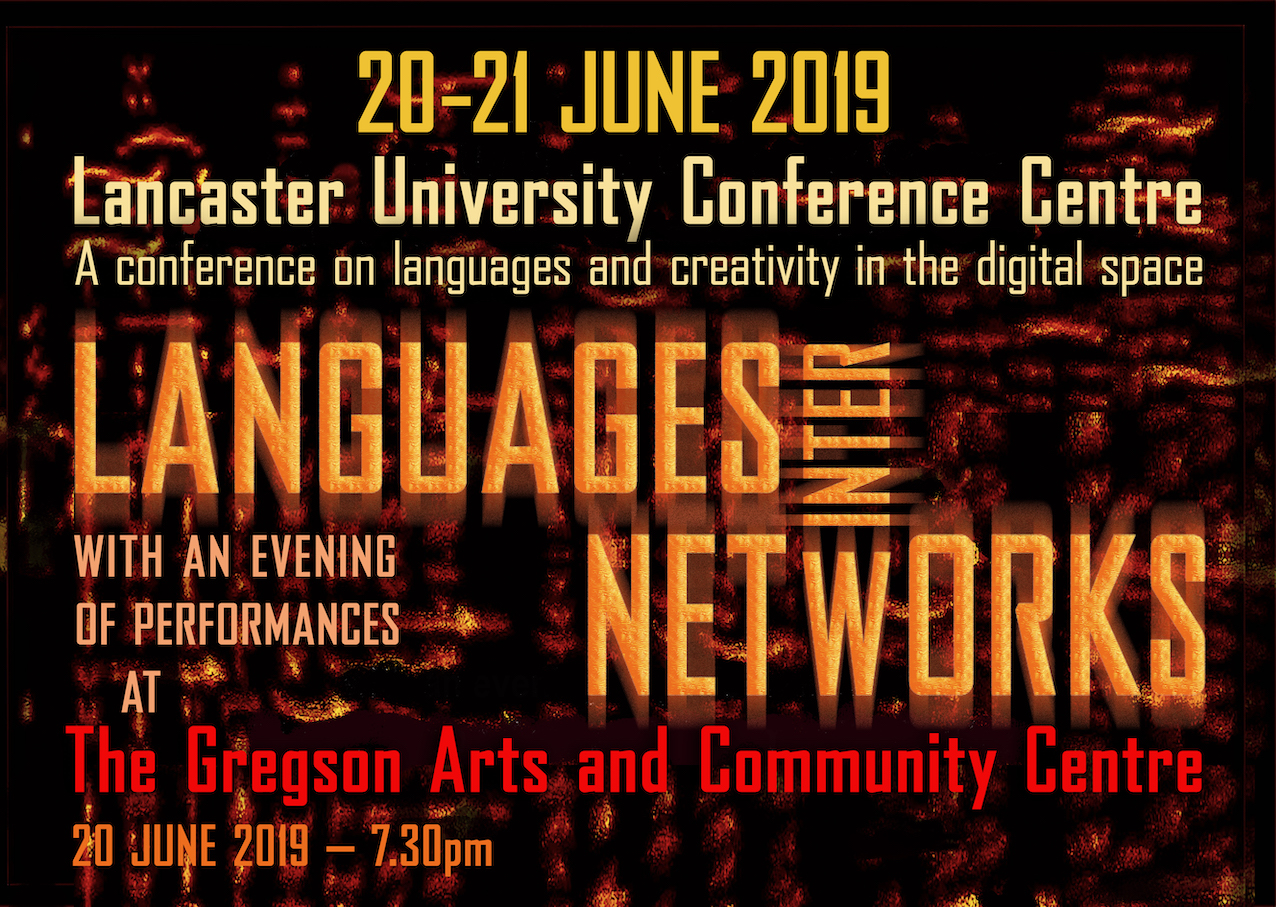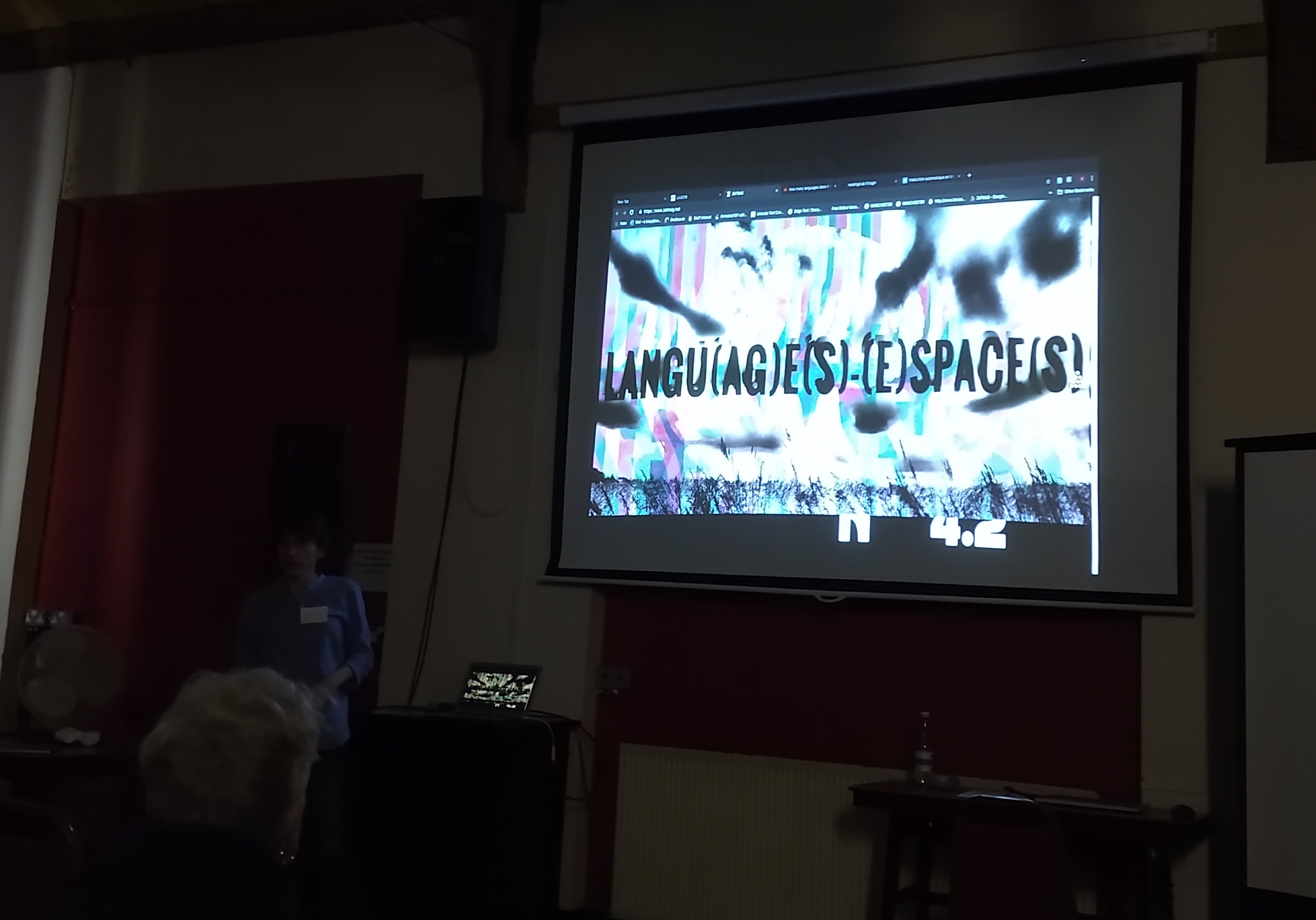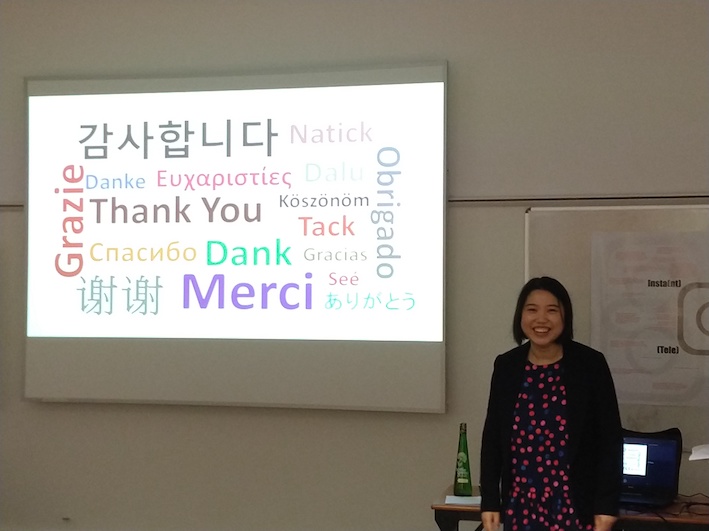
We nooses tous des bastardi elettronici che usano lingue globali’
Ours Lingages. The internet is my language mother. I speak with a voice that’s not my own, I speak in other voices, not my voice. We are all e-strangers, all nomads that use globish bastard languages. We are the alienated translated (wo)men in-between code and emotion, in-between our wish to be visible and our longing for intimacy. L’entre-deux = void. Can’t we be ‘with’ instead?
These words by the Montpellier-based Dutch artist Annie Abrahams were the motto of the second and last conference in the two-year Creative Web of Languages project (see the report about the previous event on Multilingual Digital Authorship), funded by the Multilingualism: Empowering Individuals, Transforming Societies AHRC Open World Research Initiative, with additional support from Lancaster University’s Faculty of Social Sciences and Department of Languages and Cultures. The nature and culture of those ‘globish bastard languages’, the voices with which we speak and that speak (to) us through machines and in the digital space were at the heart of the event. We addressed two central questions of the project: To what extent and under which conditions does the web offer a particularly suitable space and tool for the creative expression of fluid linguistic and cultural identities? And what are the cultural and political potentials of such creative digital outputs? Additionally, we kept coming back to how artists’ multilingual and multicultural backgrounds inform their digital creative work.
John Cayley opened the conference and his keynote talk on ‘The Future of Language’, which took Vilém Flusser’s The Future of Writing as a guiding thread and the basis of a reflective rewriting, by stating that writing is ‘just another language’. What language is, its relationship to (modes of) writing, what the plurality of languages means in the digital space, and whether code and machine language should be considered to be languages at all were questions that then ran throughout the discussions over the two days.
Jean-Pierre Balpe’s keynote on ‘Literary Creation: Computing and Its Languages’ responded to John Cayley’s observation that code is not language because it has not evolved in the same organic way through live human communication as do natural languages, by reminding us of the French distinction between langue and langage, which makes it impossible in French to talk about ‘language’ as a single concept or phenomenon. Balpe then went on to present his text generation software, which has allowed him to create a multifaceted and ephemeral virtual textual fictional world in constant flux, based on an ever-growing database of terms drawn from the web and fed back to it through his website.
Rui Torres continued the reflections on generative writing and the interplay between code and natural language, also speaking from a position between poet and scholar in his keynote ‘Translating Code, Coding Translation’. He presented a work created specifically for the occasion, fakephone4a(n)droid, an analogue-digital hybrid that consists of a pack of smartphone-size cards with printed texts that mix code with poetry, including QR codes that activate synthetic voice recordings. Jerome Fletcher, meanwhile, focused on an entirely different potential of the synthetic voice among the machines’ contributions to, and interventions in, human communication. In his keynote entitled ‘Semi-autonomous Human Beings: The Constraints of Alternative and Augmentative Communication (AAC) Devices’, Fletcher presented an ongoing project which reflects on the limits and creative potential of facilitated communication, which proposes to bridge the gap between human intention and computer-assisted expression.

Further talks ranged from artificial intelligence and its affordances (Richard Harper), as well as social media and their affordances (Charlie Gere with his ‘Of Instagrammatology’, Laura Santini about a multilingual Facebook scrapbook), through disruptive experimental ‘writing’, analogue and digital, that involves, but also goes beyond, language (Nathan Jones on glitch poetics, Lindsay Polly Crisp on Michael Landy’s Break Down, Licheng Xie on DonDelillo’s analogue imaginary prefiguring digital literature), translation and moving between languages in the digital and analogue space (Annie Abrahams’ artist talk ‘with/in languages’ (see a short video taster here), Ana Marques and Diogo Marques’s digital performance-presentation on translation and counter-translation, Claire Larsonneur on authors between languages and modes of publication), to electronic literature and creativity as manifest in specific languages and cultures (Brazilian Portuguese with Andréa Catrópa, Arabic with Reham Hosny, Tamil with Shanmugapriya, and Chinese with Astrid Nordin).

The conference was accompanied by a public event of digital performances at The Gregson Arts and Community Centre. This included the public launch of a special issue of ZeTMaG entitled Lang(u)age(s)-(E)Space(s), containing a selection of works responding to the conference topic. Traduction (Automatique), a video by Nicolas Vermeulin, founder of the digital art magazine, was offered as a taster. Visual and sound poet Ottar Ormstad then presented a selection of his works, partly created in collaboration with Taras Mashtalir. Annie Abrahams’s subsequent performance Lingagens involved a live session of the Reading Club, whereby three ‘reariters’ in Brazilian, Cantonese, and Danish respectively connected from three different countries to translate a short text from Hungarian into their own language, using a limited shared space, accompanied by a reading by the artist. Lou Sarabadzic concluded the evening with a performance playing with automatic translation, synthetic voice recording, and live speech, on what (writing) poetry means in the hybrid linguistic and multimedia space.
Overall, the conference and the performances have confirmed again that digital technologies and the existence of the World Wide Web require us to rethink what language means, how we experience our mother tongue, and how we approach languages other than our mother tongue, known or unknown. Wittgenstein’s often quoted observation that ‘The limits of my language mean the limits of my world’ also invites a new approach in this context: the limits of our language(s) have changed with the presence of a multilingual space at our fingertips, underpinned by a machine language that invisibly shapes, limits and expands our interactions, from the purely pragmatic through the playful to the poetic ones. We can’t quite grasp the shape or limits of this world, but we can try to make sure to become aware and take advantage of its creative potentials, so that we can give a positive answer to Annie Abrahams’s question cited in the motto: ‘Can’t we be “with” instead?’

(The video recording of the keynote talks will be available shortly on the YouTube channel of the Authors and the World, and a selection of papers will be published in a thematic issue of the bilingual Revue Hybrid in 2020.)






